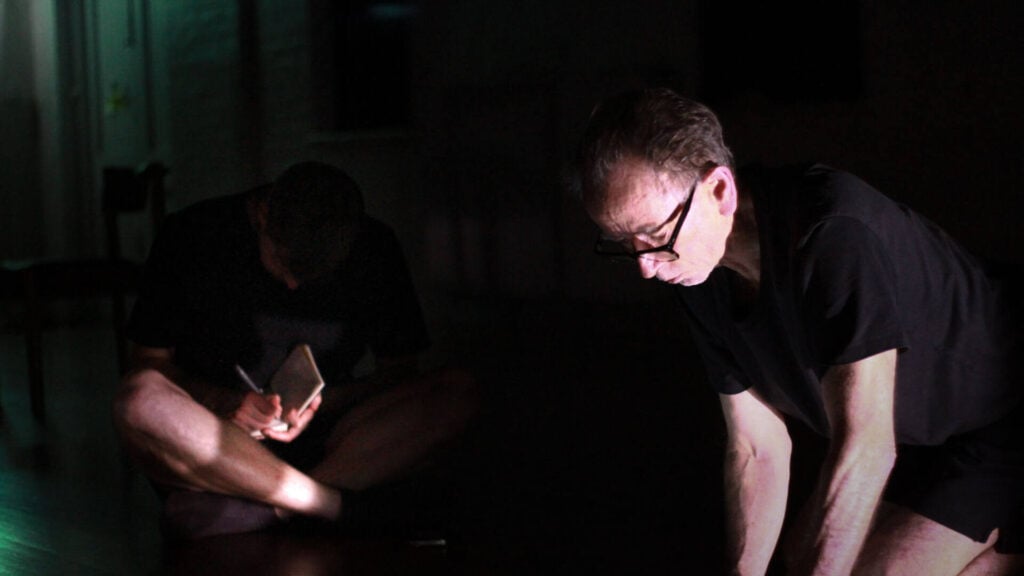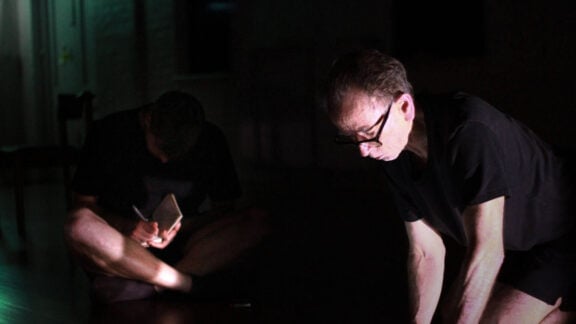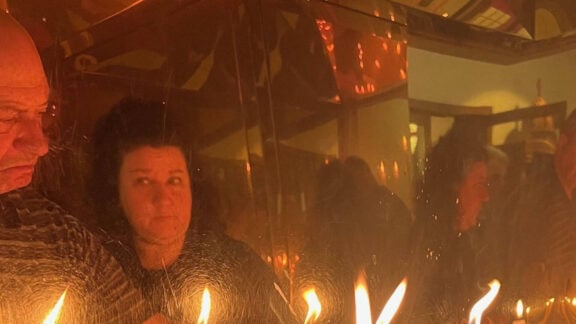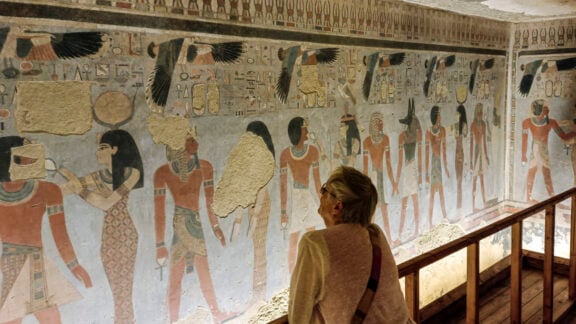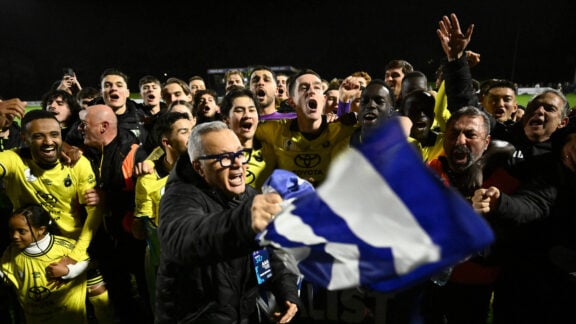Matthew (Matt) Crosby and I have known each other for some time—our paths first crossed when, as director of Multicultural Arts Victoria, I worked with Crosby on a project involving one of our leading artists, contemporary Butoh performer Yumi Umiumare.
We’ve found each other again, 20 or more years later. The NIDA-trained actor is one of the few Suzuki Method masters in Australia and a living conduit between Western and Asian theatrical canons. He has worked across Australia’s theatre ecology since the 1990s, and continues to create new work.
The return to old haunts
We met at Mario’s in Fitzroy, an old haunt and one of the few stables left on Brunswick Street — a place where two older men can still feel their past.Crosby is directing Falling Heads, for the Thursday Group, which debuts this Wednesday. He then heads to Odense, Denmark, for a season at Teater Momentum in 2025–26.
An original work, Falling Heads says Crosby was inspired by Akutagawa Ryūnosuke’s 1917 short story The Story of a Head that Fell Off, it merges dialogue, a cappella, dance, shadow play, and reportage and explores “fake news, authoritarianism, war, and the tension between mind and body.”
It is a “co-devised fable about estranged twins Tomasz and Steph, who take opposing sides in warring tribes,” says Crosby.
“Our story concerns two warring tribes—it’s not historical in any way, it’s a fable about what happens when a people of a similar culture split.”
Falling Heads has echoes of ancient Greek narratives from warring Achaeans and Trojans, Sparta and Athens, modern ones in Gaza, Ukraine and many other wars. Civilisations born of war and rarely at peace.
Ancient thespian ghosts swim in memories
Crosby orders breakfast—his movements and tone, subtle, light, curated, precise, and considered.
“One poached egg on toast with spinach,” he says. A clean breakfast, no excess. Spartan Samurai. His wiry frame is the result of a life devoted to Japanese-inspired movement theatre as much as to genetics. He is an elegant thinker, speaker, actor, and theatre-maker.
You can see, and almost feel Crosby return to Greece, to a shard of memory, from the early 1990s, when touring with The Drought by Greek Australian playwright Tom Petsinis.
“We played in one of Thessaloniki’s modern theatres, a great season – when the season ended, I jumped on a ferry and headed out, eventually landing at the ancient theatre of Thasos, on the headland overlooking the harbour.”
“It was a beautiful spot, a small amphitheatre with pine trees growing from the audience seats—stone now dilapidated by time and history. They were renovating it, but I crawled through the cyclone barrier and snuck onto the stage. It was around the time I’d just finished performing in [Barrie] Kosky’s Faust.
“In Thasos, I felt the ghosts of actors from millennia past calling me in. I let fly!”
Suddenly, a gruff mason appeared and scolded Crosby, telling him he wasn’t allowed to be there.
“I said, ‘Come on, man, I’m an actor.’ The old mason thought for a moment, then sat down and watched me do Mephistopheles from Faust.”
The mason was a natural custodian of theatre—a Greek, Thasos was his and Greece’s—and in recognising the Crosby as an actor, he acknowledged his tradition and innate right to act on that hallowed ancient stage.
“There I was, feeling like I’d stepped back 2,000 years, to the birthplace of theatre—an exchange between myself and this old mason.”
Made in Japan – the Suzuki connection
Crosby in the 1990s, trained and worked with the renowned Suzuki Tadashi, groundbreaking playwright, theorist, and educator, founder of the Suzuki Company of Toga, Japan. Suzuki developed the Suzuki Method of actor training, a rigorous discipline emphasising physical control, breath, and the body’s central role in performance.
Suzuki’s Macbeth for example, was a stark exploration of illusion, guilt, and memory. The story centres on an ageing man who believes he is Macbeth, haunted by his supposed crimes. Condensed to an hour, it focuses on key scenes and monologues, framed by Suzuki’s invention of a ‘Farewell Cult’—robed figures in Ray-Bans carrying staffs topped with sheep skulls—who take the place of the witches and urge the man to let go of “the burdens of memory, history and even words themselves.”
Suzuki once said, “In western drama, from the Greeks to Shakespeare, we are usually dealing with protagonists who are very clear about their desires and goals. … Illusion is founded on strong desire. … Macbeth is a play that shows the result of this ambivalence.”
“Suzuki was a huge influence on my work,” he says. Crosby learned how to be “practical and self-reliant” in independent theatre from Suzuki.
“You can’t put on shows with huge sets and designs. The whole show must be able to be packed into a suitcase and performed anywhere.”
Janus like one face to the east and another to the west
Crosby fuses Asian and Western theatrical traditions—Butoh, Suzuki Method, Greek tragedy, European modernism, and absurdism—to try and make new narratives.
“These ancient forms, East and West,” he says, “all deal with archetypal characters.”
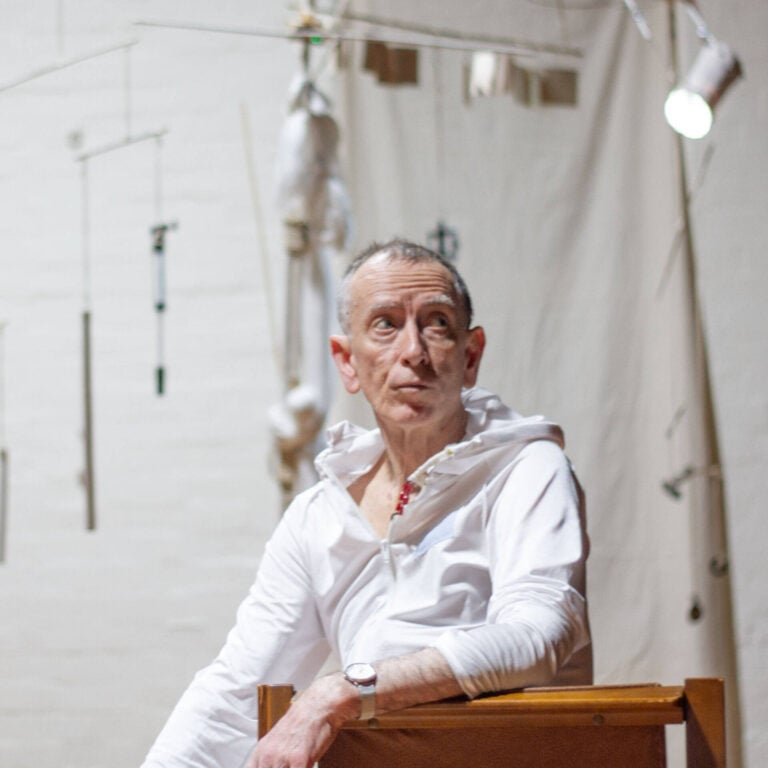
There’s a scene in Falling Heads where the occupying regime, The Sunflowers, hold a party, and attendees seem to be on acid.
“I have often said the score of that scene owes a lot to the absurdist movement—Ionesco, Jarre and others.”
The acappella chants inspired by ancient Balkan songs, stripped of vibrato, while “The People of the Wild Boars—who are colonised by the Sunflowers—meditate with tonal chanting,” a practice Crosby developed from work with the Polish group Pieśń Kozła, or Song of the Goat, “code for Greek tragedy,” he says.
“My view is that, ultimately, if you are doing theatre that centres the craft of the actor, then you are leaning on Greek theatre traditions,” Crosby says.
In Asian and Western traditions, Crosby says, archetypes and stories are used to ask, “What is right, and what is wrong in society—ethically?”
“Greek theatre asked what our society agrees is an appropriate way to proceed. The theatre, especially the amphitheatre, is a forum for exchange between the drama on stage and the audience who considers what is taking place.”
“In our show, the stage is in the middle, and the audience sits on either side. There’s a break in the traditional relationship between actors and audience, which allows us to explore archetypal characters. In the original, there’s only one named character—all the others are archetypes: the soldier, the captain, the twins, the oracle. They all become metaphors for what happens when people tear themselves apart. This is about all conflicts, all wars—Gaza, Ukraine, Yemen, even the US now.”
Conflict and communion
As a theatre-maker, Crosby seeks what drama has sought to do—move, critique, look for truth, communicate, and hopefully reach catharsis, through agreement between audience and actor. Theatre always sought to question the morality of power and ideas, dogmas and values, says Crosby, who’s concerned about the current polarisation.
“It just seems to have exploded! People take sides, and it’s difficult to have dialogue. Ultimately, you think, it could be the demise of the US as a state and civil war is not new to the Americans.”
“Theatre is also about conflict and war, between people, families, nations, lovers and so on. Regardless of politics, conflict seems to be the eternal human condition. Even the phrase ‘theatre of war’ carries resonance—it’s part of our being.”
Crosby recalls what Australian playwright John Romeril told him in the 1990s, “Do you know there hasn’t been a day in the history of humanity when people haven’t been at war?”
“We keep making the same mistakes—losing sight of communication, falling into misunderstanding.”
Towards Europe—and back
Falling Heads opens this week on Wednesday in North Melbourne. Crosby says he’ll “open the doors to audiences” in the same way the stone mason did for him in Thasos 30 years ago.”
“Regardless of the huge size of some amphitheatres, you always had a sense of intimacy between audience and actor.”
More than a director, Crosby is a curator magician—in communion with ancient Greek, Chinese, and Japanese theatre, when it “wasn’t just entertainment—but a ritualised, and often communal experience”.
“Theatre was a way of asking, ‘What is right and what is wrong?'”
The day after Falling Heads closes, the company flies to Copenhagen to work with Danish artists in collaboration.
“I’ve developed strong connections with Asia,” says Crosby, “now want to extend them to Europe—to be the bridge Australia can be.”
“I think it would be fantastic to go to Greece,” he adds.
“In the current milieu, our work would find a natural home.”
Falling Heads opens this Wednesday for a season at the Small Hall, 430 Queensberry St, North Melbourne
